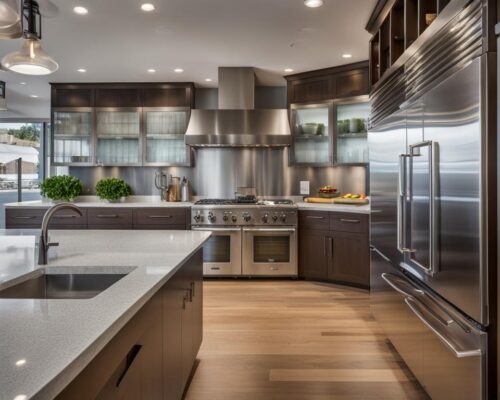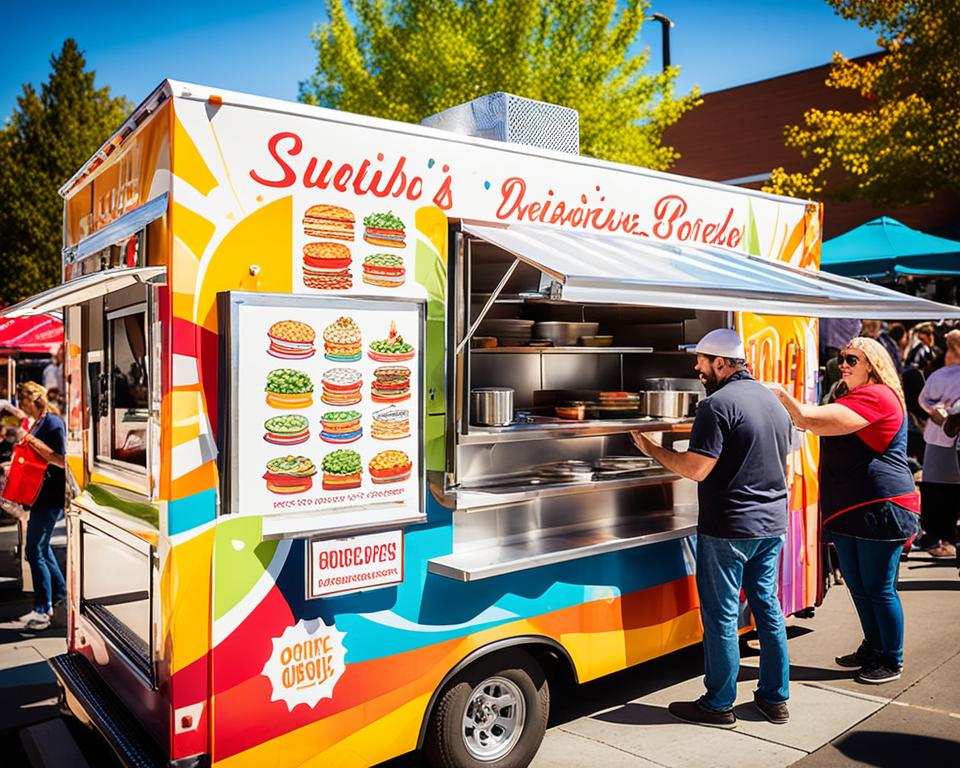If you have a passion for food and enjoy creating memorable dining experiences, starting a catering services business can be a lucrative and fulfilling venture. Whether it’s event catering, wedding receptions, corporate functions, or intimate parties, there is a growing demand for professional caterers who can deliver exceptional culinary experiences.
In this article, we will guide you through the essential steps to successfully launch your catering services business. From finding your specialty to navigating licensing and permits, creating a menu, planning your location, and preparing a comprehensive business plan, we will cover everything you need to know to get started on the path to success as a caterer.
So, if you dream of being the go-to caterer in your area, keep reading to learn how to turn your passion for food into a thriving catering company.
Key Takeaways:
- Starting a catering services business presents a lucrative opportunity in a growing industry.
- Choose a specialty or niche to stand out from the competition.
- Research and comply with local licensing and permit requirements.
- Create an enticing menu that aligns with your target market and cooking facilities.
- Plan your location based on whether you will do on-site or off-site catering.
Find Your Specialty
Finding a specialty for your catering business is crucial in the highly competitive market. By identifying your niche, you can stand out from the competition and attract customers who are specifically looking for the services you offer.
Consider the type of food you want to focus on serving. One popular option is catering to vegan cuisine, which is an increasingly popular choice among individuals pursuing a plant-based lifestyle. By offering delicious and creative vegan dishes, you can tap into a growing market and cater to a niche clientele.
Another specialization to consider is gluten-free cuisine. With the rise in gluten intolerance and celiac disease awareness, many people are seeking gluten-free options to accommodate their dietary needs. By providing a range of gluten-free dishes, you can cater to this specific market segment.
When starting out, it’s a good idea to begin with smaller functions such as cocktail parties and wedding showers. These events allow you to showcase your skills, build a solid client base, and receive valuable word-of-mouth referrals.
As your catering business grows and gains a reputation for excellence, you can expand your services to cater to larger events like weddings, corporate functions, and conferences.
To successfully cater to your chosen niche and expand your catering services, it’s important to have a hiring plan in place. Determine the roles and responsibilities of your team members, such as food preparation, sales, accounting, and event coordination.
Research is a key component of finding your specialty. Study your competitors to understand the local market and identify any unexplored niches that you can fill. Get to know your potential customers and their preferences to tailor your offerings accordingly.
By focusing on a specific niche and continuously delivering exceptional service and cuisine, you can position your catering business as a go-to choice for customers seeking specialized catering services.
Benefits of Finding Your Specialty
- Stand out from the competition in a crowded market
- Tap into a niche market and cater to specific dietary preferences
- Build a loyal customer base by consistently delivering high-quality cuisine
- Expand your catering services to larger and more lucrative events
- Develop a reputation as a specialized caterer, attracting more customers in your chosen niche
Developing a specialty in niche catering, such as vegan cuisine or gluten-free cuisine, can set your catering business apart and attract a loyal customer base. Start with smaller functions to build your reputation, and as your business grows, expand your services to larger events. Research your competitors and target market to identify unexplored niches and refine your offerings accordingly.
Investigate Local Licensing and Permits
Before starting your catering business, it is important to understand and comply with local licensing and permit requirements. Each state has different regulations, so research the specific requirements for your area. Common licenses and permits include a general business license, zoning permit, and health permit.
Contact your local health department and Secretary of State’s office for guidance on the licenses and permits you need.
Here is a list of the essential licenses and permits you may need for your catering business:
| License/Permit | Description |
|---|---|
| General Business License | A license that allows you to operate a catering business in your area. It ensures that you meet the basic requirements set by the local government. |
| Zoning Permit | A permit that ensures your catering business complies with local zoning regulations. It confirms that your chosen location is suitable for operating a commercial enterprise. |
| Health Permit | A permit issued by the local health department to ensure that your catering business meets the required health and safety standards. It may involve inspections of your kitchen and food handling practices. |
Keep in mind that these are general requirements, and additional permits may be needed depending on the specific services you offer. Contact the relevant authorities to stay updated on any changes to local regulations.
Create Your Menu and Plan Your Location
Creating an enticing menu is crucial for attracting customers to your catering business. Consider your capacity, cooking facilities, and target market when designing your menu. A well-planned menu will showcase your culinary expertise and cater to the preferences and dietary restrictions of your clients.
If you’re starting out with a small-scale catering operation, you may be able to work with your existing cooking facilities. However, as your business grows, you may need to invest in a commercial kitchen.
If you don’t have access to a commercial kitchen, explore options for renting or sharing a kitchen space with other food businesses. This can help you reduce costs and ensure you have the necessary equipment and facilities to prepare your menu items.
Next, consider whether you will focus on on-site catering or off-site catering. On-site catering involves preparing and serving food at a designated venue, while off-site catering involves preparing the food in your kitchen and delivering it to the event location.
If you choose on-site catering, you’ll need to ensure that the venue has the necessary cooking facilities and equipment to support your menu. This could include ovens, stoves, refrigeration units, and serving stations. Collaborating with venues that have existing commercial kitchens can make the process more convenient.
If you opt for off-site catering, you’ll need to invest in transportation equipment to deliver your prepared food to the event location. This could include refrigerated vans or insulated containers to keep the food at the proper temperature during transport.
Pros and Cons of On-site and Off-site Catering
Both on-site and off-site catering have their own advantages and considerations. Here’s a breakdown:
On-site Catering:
- Allows for freshly prepared food and the ability to cater to specific dietary needs on-site.
- Enables you to oversee the food presentation and quality control more closely.
- May limit the number of events you can cater simultaneously due to space constraints.
Off-site Catering:
- Provides more flexibility, allowing you to cater multiple events at different locations simultaneously.
- Reduces the need for on-site cooking facilities, potentially lowering overhead costs.
- Requires careful planning and coordination to ensure timely delivery and maintaining food quality during transportation.
Assess your resources, business goals, and customer preferences to determine the best approach for your catering services.

Designing your menu and planning your location are vital steps in launching a successful catering business. Take the time to create a menu that reflects your culinary skills, considers your cooking facilities, and caters to the preferences of your target market. Whether you choose on-site or off-site catering, ensure that your location and equipment can support your operations effectively.
Get Ready to Buy Equipment and Prepare a Business Plan
As you prepare to launch your catering business, it’s crucial to assess your equipment needs and budget accordingly. Start by making a comprehensive list of all the catering equipment you will need, from utensils to cooling equipment. Obtain quotes from reputable restaurant supply companies to compare prices and quality.
Consider your financing options and carefully weigh the benefits of leasing versus purchasing the catering equipment. Leasing may be a more cost-effective option in the beginning, allowing you to conserve your startup capital. However, purchasing can provide long-term cost savings and greater control over your equipment.
In addition to equipment, developing a thorough and well-structured business plan is essential. Your business plan should outline your goals, target market, marketing strategy, and financial projections. Make sure to allocate sufficient budget for startup costs and ongoing operational expenses for at least 12 months. This will help you stay on track and make informed decisions as you navigate the challenges of starting a new catering business.
Implementing an effective and affordable marketing strategy is also crucial for success. Update your menus and prices regularly to entice potential customers. Curate positive reviews on social media platforms and utilize the power of word-of-mouth advertising. Post appealing food photos to showcase your culinary prowess and grab the attention of your target audience. A well-crafted marketing strategy will help you attract clients and establish a strong presence in the competitive catering industry.
FAQ
How do I find my specialty in the catering business?
To find your specialty, consider the type of food you want to serve and the niche market you want to cater to. Start with smaller functions like cocktail parties and wedding showers to build a solid client base, and then expand to larger events as your business grows.
What licenses and permits do I need to start a catering business?
The licenses and permits you need to start a catering business vary by state. Common requirements include a general business license, zoning permit, and health permit. Contact your local health department and Secretary of State’s office for guidance on the specific licenses and permits required in your area.
How do I create an enticing menu for my catering business?
When creating your menu, consider your capacity, cooking facilities, and target market. Decide whether you will do on-site or off-site catering and plan your location accordingly. If you need a commercial kitchen, explore options for renting or sharing a kitchen space. Evaluate the pros and cons of on-site and off-site catering to determine the best approach for your business.
What equipment do I need for a catering business?
The equipment you need for a catering business depends on your specific needs and capacity. Make a list of all the items you will need, from utensils to cooling equipment, and obtain quotes from restaurant supply companies. Consider financing options and weigh the benefits of leasing versus purchasing equipment.
How do I prepare a business plan for my catering business?
A comprehensive business plan is crucial for the success of your catering business. Your plan should outline your goals, target market, marketing strategy, and financial projections. Ensure your budget covers startup costs and operating expenses for at least 12 months. Implement an affordable marketing strategy, such as updating your menus and prices, curating reviews on social media, and posting appealing food photos to attract potential customers.


























